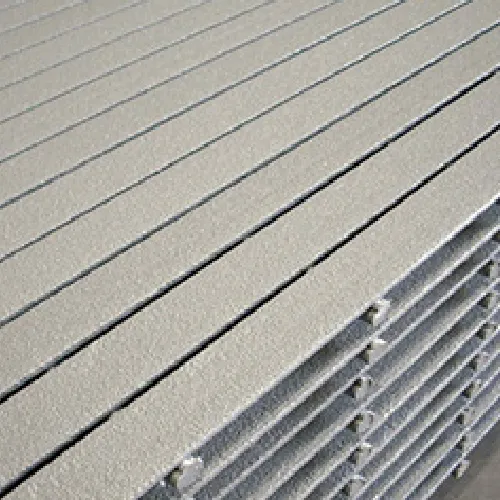loading...
- No. 9, Xingyuan South Street, Dongwaihuan Road, Zaoqiang County, Hengshui, Hebei, China
- admin@zjcomposites.com
- +86 15097380338
- Welcome to visit our website!
fiberglass grating panels
The Advantages of Fiberglass Grating Panels
Fiberglass grating panels have emerged as a preferred choice in various industries due to their unique properties and advantages over traditional materials like steel and wood. In the modern world, where environmental concerns and economic factors play crucial roles in material selection, fiberglass grating is gaining prominence. This article delves into the benefits of fiberglass grating panels, their applications, and factors to consider when choosing them.
Understanding Fiberglass Grating
Fiberglass grating is a composite product made of fiberglass reinforced plastic (FRP) that combines glass fibers and resin to create a durable, lightweight material. The manufacturing process includes pultrusion or molding, resulting in a sturdy yet flexible product. Fiberglass grating is available in various styles, including molded and pultruded, each offering distinct characteristics suited to specific applications.
Advantages of Fiberglass Grating Panels
1. Corrosion Resistance One of the most significant advantages of fiberglass grating panels is their resistance to corrosion. Unlike steel or aluminum, which can succumb to rust and decay due to exposure to moisture and chemicals, fiberglass grating can withstand harsh environments, including marine, chemical processing, and wastewater applications. This resilience translates to lower maintenance costs and longer lifespans.
2. Weight and Strength Fiberglass grating panels are notably lighter than metal alternatives, making them easier to handle and install. Despite their lightweight nature, they offer impressive strength-to-weight ratios. This combination allows for easier transportation and installation while reducing the load on supporting structures.
3. Slip Resistance Safety is paramount in industrial and commercial environments. Fiberglass grating offers superior slip resistance due to its textured surface, which is particularly beneficial in areas exposed to spills or wet conditions. Various surface options can be tailored for specific needs, enhancing workplace safety.
4. Design Versatility Fiberglass grating panels come in a range of colors, patterns, and sizes, allowing for customization to fit specific project requirements. This design versatility is particularly advantageous in architectural applications where aesthetics are as important as functionality.
5. Non-Conductive and Non-Magnetic Fiberglass is a non-conductive material, making it ideal for electrical environments where safety is a concern. Additionally, it is non-magnetic, making it suitable for use in spaces where magnetic interference could be problematic.
fiberglass grating panels

6. Environmental Benefits The production of fiberglass grating can utilize recycled materials, contributing to a reduced carbon footprint. Furthermore, its durability means that less frequent replacement is necessary, further diminishing environmental impact over the long term.
Applications of Fiberglass Grating Panels
Fiberglass grating panels are utilized across a wide range of industries
- Chemical Processing Due to their resistance to corrosive chemicals, fiberglass grating is often employed in chemical plants where spills and vapors are a concern. - Water Treatment Facilities The moisture-rich environments in water treatment facilities make fiberglass grating an ideal choice, where it minimizes rust and decay common with metal options. - Marine Environments Thanks to its corrosion resistance, fiberglass grating is widely used in marinas and coastal areas. - Commercial and Industrial Building Ideal for walkways, platforms, and trench covers, fiberglass grating can be found in various construction projects.
Factors to Consider When Choosing Fiberglass Grating
When selecting fiberglass grating panels for a project, several factors should be considered
1. Load Requirements Assess the load-bearing capacity necessary for the application. 2. Environmental Conditions Understand the specific environmental conditions the grating will face, such as chemical exposure or moisture levels. 3. Safety Standards Ensure compliance with safety regulations and standards relevant to the industry.
Conclusion
Fiberglass grating panels offer an array of benefits that make them a superior choice compared to traditional materials. Their corrosion resistance, lightweight nature, slip resistance, and versatility make them suitable for a variety of applications across different sectors. As industries continue to prioritize safety, durability, and sustainability, fiberglass grating will undoubtedly play a significant role in future construction and design.
-
Transform Your Spaces with FRP Grating SolutionsNewsNov.04,2024
-
The Versatility and Strength of FRP RodsNewsNov.04,2024
-
The Excellence of Fiberglass Water TanksNewsNov.04,2024
-
The Benefits of FRP Grating for Your ProjectsNewsNov.04,2024
-
Elevate Your Efficiency with FRP Pressure VesselsNewsNov.04,2024
-
Welcome to the World of FRP Pressure VesselsNewsOct.12,2024
-
Unveiling the Future of Filtration: Why FRP Filter Vessels are a Game ChangerNewsOct.12,2024
